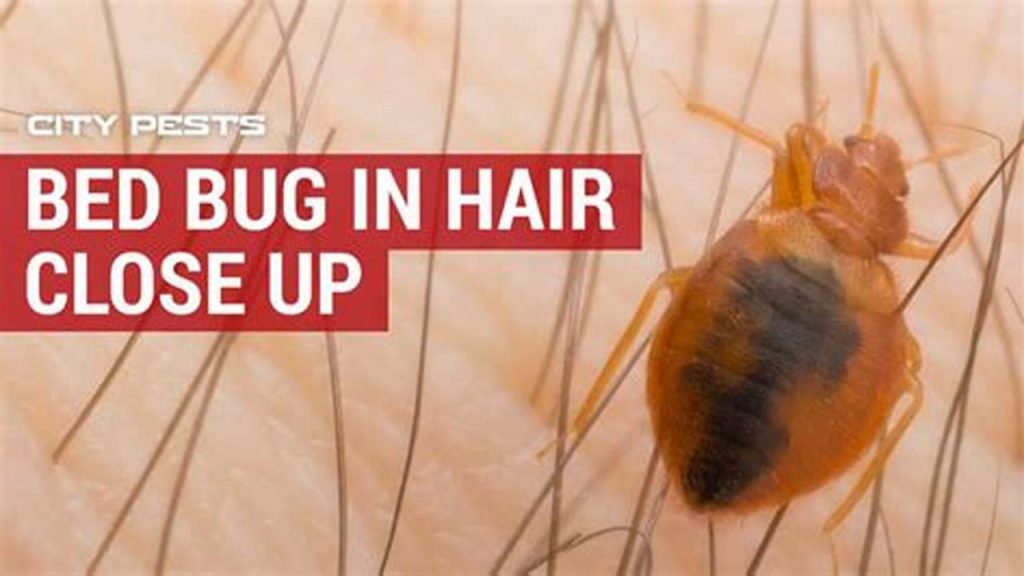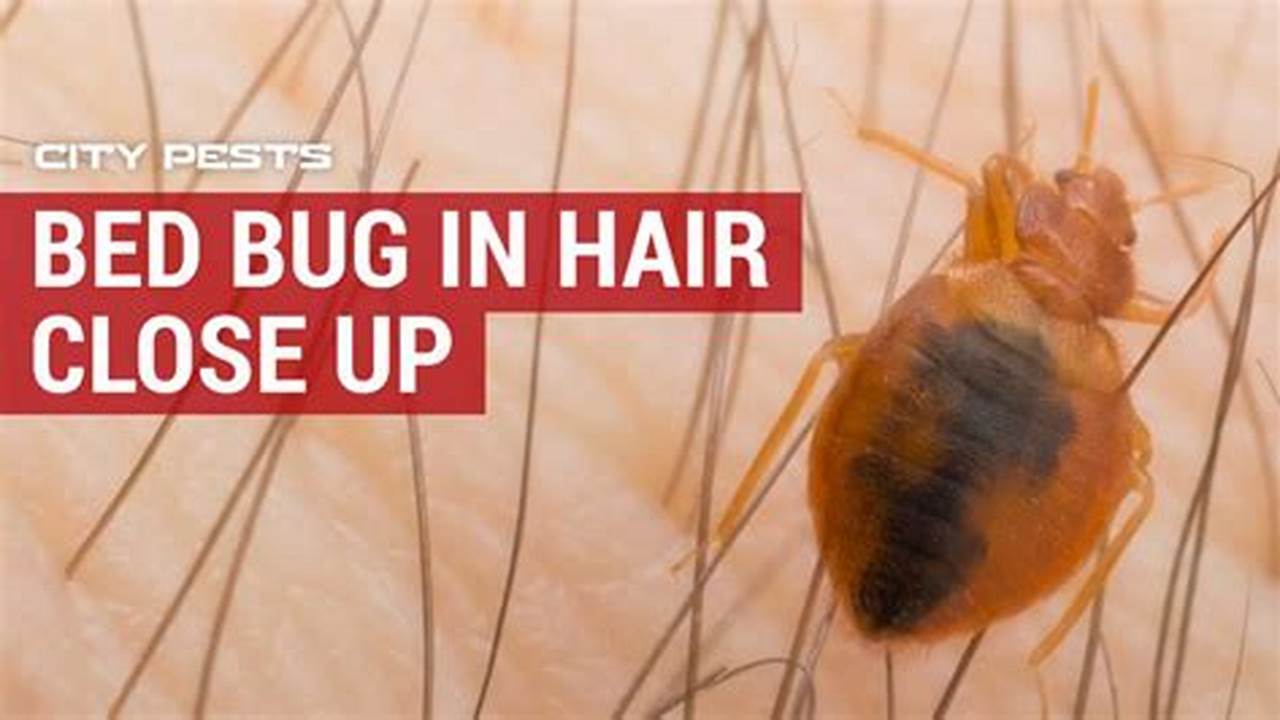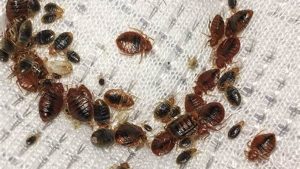The idea of bed bugs in hair is a daunting one. Bed bugs are tiny, wingless insects that feed on the blood of humans and animals. They are often found in beds, mattresses, and other furniture, and can be a nuisance. While bed bugs can bite anywhere on the body, they are not known to get in hair. But can bed bugs bite through clothes? There are a few reasons why bed bugs do not get in hair. First, hair is too thin and slippery for bed bugs to grip onto. Second, the scalp is too oily for bed bugs to bite. Finally, hair is constantly moving, which makes it difficult for bed bugs to stay attached. Similarly, bed bugs generally cannot bite through clothing; they require direct skin contact to feed. However, they can crawl under loose clothing to access exposed skin, making it important to take precautions against these persistent pests.
Despite these reasons, there have been a few isolated cases of bed bugs being found in hair. These cases are rare, and it is likely that the bed bugs were simply clinging to the hair after biting the scalp. While bed bugs may not be able to get in hair, it is important to be aware of them and to take steps to prevent them from entering homes.
Will Bed Bugs Get in Your Hair?

Bed bugs are tiny, wingless insects that feed on the blood of humans and animals. They are often found in beds, mattresses, and other furniture, and can be a nuisance. While bed bugs can bite anywhere on the body, they are not known to get in hair.
- Hair is too thin and slippery for bed bugs to grip onto.
- The scalp is too oily for bed bugs to bite.
- Hair is constantly moving, which makes it difficult for bed bugs to stay attached.
- Bed bugs are more likely to bite exposed skin.
- Bed bugs are attracted to warmth and moisture.
- Bed bugs can spread diseases.
- Bed bugs can be difficult to get rid of.
- There are a number of things you can do to prevent bed bugs from entering your home.
- If you think you have bed bugs, it is important to contact a pest control professional.
While bed bugs may not be able to get in hair, it is important to be aware of them and to take steps to prevent them from entering your home. To effectively Get Rid of Bed Bugs, consider vacuuming your living space daily, sealing any small hiding areas, and washing all bedding and clothing in hot water. If you suspect an infestation, it’s essential to contact a pest control professional for assistance. If you have any questions or concerns, please contact a pest control professional.
Hair is too thin and slippery for bed bugs to grip onto.
This is one of the main reasons why bed bugs do not get in hair. Bed bugs have tiny claws that they use to grip onto surfaces. Hair is too thin and slippery for these claws to get a good grip. This makes it difficult for bed bugs to stay attached to hair, and they are more likely to fall off.
There are a few real-life examples of bed bugs being found in hair. However, these cases are rare. In most cases, the bed bugs were simply clinging to the hair after biting the scalp. Bed bugs are not able to stay attached to hair for long periods of time, and they will eventually fall off.
The understanding that hair is too thin and slippery for bed bugs to grip onto has a number of practical applications. For example, this knowledge can be used to develop new methods for preventing and treating bed bug infestations. Additionally, this information can be used to educate the public about bed bugs and how to avoid them.
In summary, hair is too thin and slippery for bed bugs to grip onto. This is one of the main reasons why bed bugs do not get in hair. This knowledge has a number of practical applications, including the development of new methods for preventing and treating bed bug infestations.
The scalp is too oily for bed bugs to bite.
This is another reason why bed bugs do not get in hair. Bed bugs have a preference for biting exposed skin. The scalp is covered in hair, and the skin on the scalp is also oily. This makes it difficult for bed bugs to bite the scalp.
There are a few real-life examples of bed bugs biting the scalp. However, these cases are rare. In most cases, the bed bugs were simply clinging to the hair after biting the scalp. Bed bugs are not able to stay attached to the scalp for long periods of time, and they will eventually fall off.
The understanding that the scalp is too oily for bed bugs to bite has a number of practical applications. For example, this knowledge can be used to develop new methods for preventing and treating bed bug infestations. Additionally, this information can be used to educate the public about bed bugs and how to avoid them.
In summary, the scalp is too oily for bed bugs to bite. This is one of the main reasons why bed bugs do not get in hair. This knowledge has a number of practical applications, including the development of new methods for preventing and treating bed bug infestations.
Hair is constantly moving, which makes it difficult for bed bugs to stay attached.
This is one of the main reasons why bed bugs do not get in hair. Bed bugs have tiny claws that they use to grip onto surfaces. Hair is constantly moving, which makes it difficult for bed bugs to get a good grip. This makes it difficult for bed bugs to stay attached to hair, and they are more likely to fall off.
- Scalp movement The scalp is constantly moving, which makes it difficult for bed bugs to stay attached. This is because the scalp is covered in muscles that are constantly contracting and relaxing. This movement makes it difficult for bed bugs to get a good grip on the scalp, and they are more likely to fall off.
- Hair growth Hair is constantly growing, which makes it difficult for bed bugs to stay attached. This is because the hair shaft is constantly pushing the bed bug away from the scalp. This makes it difficult for bed bugs to stay in one place, and they are more likely to fall off.
- Hair shedding Hair is constantly shedding, which makes it difficult for bed bugs to stay attached. This is because the old hair shafts are constantly being pushed out by the new hair shafts. This makes it difficult for bed bugs to find a stable place to attach themselves, and they are more likely to fall off.
- Hair washing Hair washing can also make it difficult for bed bugs to stay attached. This is because the shampoo and conditioner can make the hair slippery, which makes it difficult for bed bugs to get a good grip. Additionally, the water can wash away the bed bugs from room, making it even more difficult for them to stay attached.
In summary, hair is constantly moving, which makes it difficult for bed bugs to stay attached. This is due to a combination of scalp movement, hair growth, hair shedding, and hair washing. These factors make it difficult for bed bugs to find a stable place to attach themselves, and they are more likely to fall off.
Bed bugs are more likely to bite exposed skin.
This is because bed bugs are attracted to warmth and moisture. Exposed skin is more likely to be warm and moist than skin that is covered by clothing. Additionally, bed bugs are more likely to be able to bite exposed skin because there is no clothing to their bites.
The fact that bed bugs are more likely to bite exposed skin is a critical component of understanding whether or not bed bugs will get in hair. This is because hair is not typically exposed skin. Hair is covered by a layer of skin called the scalp. The scalp is not as warm or moist as exposed skin, and it is also covered in hair, which makes it difficult for bed bugs to bite.
There are a few real-life examples of bed bugs biting the scalp. However, these cases are rare. In most cases, the bed bugs were simply clinging to the hair after biting the scalp. Bed bugs are not able to stay attached to the scalp for long periods of time, and they will eventually fall off.
The understanding that bed bugs are more likely to bite exposed skin has a number of practical applications. For example, this knowledge can be used to develop new methods for preventing and treating bed bug infestations. Additionally, this information can be used to educate the public about bed bugs and how to avoid them.
Bed bugs are attracted to warmth and moisture.
Bed bugs are attracted to warmth and moisture because these conditions are ideal for their survival and reproduction. Bed bugs are small, wingless insects that feed on the blood of humans and animals. They are often found in beds, mattresses, and other furniture, where they can easily access their food source. Warmth and moisture are also important for bed bug eggs to hatch and develop into nymphs. Therefore, bed bugs are more likely to be found in areas that are warm and moist, such as bedrooms, bathrooms, and bed bugs in the kitchens.
The fact that bed bugs are attracted to warmth and moisture is a critical component of understanding whether or not bed bugs will get in hair. This is because hair is not typically a warm or moist environment. Hair is covered by a layer of skin called the scalp, which is not as warm or moist as exposed skin. Additionally, hair is constantly moving, which makes it difficult for bed bugs to stay attached. As a result, bed bugs are less likely to get in hair than they are to bite other areas of the body that are more exposed, warm, and moist.
There are a few real-life examples of bed bugs biting the scalp. However, these cases are rare. In most cases, the bed bugs were simply clinging to the hair after biting the scalp. Bed bugs are not able to stay attached to the scalp for long periods of time, and they will eventually fall off. This is because the scalp is not a suitable environment for bed bugs to survive and reproduce.
The understanding that bed bugs are attracted to warmth and moisture has a number of practical applications. For example, this knowledge can be used to develop new methods for preventing and treating bed bug infestations. Additionally, this information can be used to educate the public about bed bugs and how to avoid them.
In summary, bed bugs are attracted to warmth and moisture because these conditions are ideal for their survival and reproduction. Hair is not typically a warm or moist environment, and it is also constantly moving, which makes it difficult for bed bugs to stay attached. As a result, bed bugs are less likely to get in hair than they are to bite other areas of the body that are more exposed, warm, and moist.
Bed bugs can spread diseases.
Bed bugs can spread a number of diseases, including Chagas disease, which can cause heart failure, and Q fever, which can cause pneumonia. Bed bugs can also spread other diseases, such as the plague and tularemia. While these diseases are rare, they can be serious, and it is important to be aware of the risks.
The fact that bed bugs can spread diseases is a critical component of understanding whether or not bed bugs will get in hair. This is because if bed bugs can spread diseases, then it is important to take steps to prevent them from getting in hair. Hair is a potential reservoir for bed bugs, and if bed bugs can get in hair, then they can potentially spread diseases to the scalp and other parts of the body.
There are a few real-life examples of bed bugs spreading diseases through hair. In one case, a woman developed Chagas disease after being bitten by a bed bug that was living in her hair. In another case, a man developed Q fever after being bitten by a bed bug that was living in his beard.
The understanding that bed bugs can spread diseases has a number of practical applications. For example, this knowledge can be used to develop new methods for preventing and treating bed bug infestations. Additionally, this information can be used to educate the public about bed bugs and how to avoid them.
In summary, bed bugs can spread diseases, and this is a critical component of understanding whether or not bed bugs will get in hair. There are a few real-life examples of bed bugs spreading diseases through hair, and the understanding that bed bugs can spread diseases has a number of practical applications.
Bed bugs can be difficult to get rid of.
Understanding this aspect is critical in the context of “will bed bugs get in your hair” because it highlights the challenges involved in eliminating bed bugs once they have infested an area. Despite the fact that bed bugs are unlikely to reside in hair, it is essential to be aware of their persistence and the potential difficulties in eradicating them if they do infest the hair or surrounding areas.
- Chemical resistance Bed bugs have developed resistance to many commonly used insecticides, making them difficult to kill with chemical treatments. This resistance can make it challenging to eliminate bed bugs from hair, as traditional treatments may not be effective.
- Hiding places Bed bugs are skilled at hiding in small cracks and crevices, making them difficult to locate and eliminate. This can be particularly problematic in the context of hair, as bed bugs may hide in the folds and crevices of the scalp or hair.
- Multiple life stages Bed bugs go through multiple life stages, from eggs to nymphs to adults. This means that even if some bed bugs are killed, others may remain undetected and continue to reproduce. This can make it difficult to completely eliminate bed bugs from hair or the surrounding environment.
- Professional treatment In many cases, professional treatment is necessary to completely eliminate bed bugs. This can be expensive and time-consuming, and it may require multiple treatments. This can be a significant challenge, especially if bed bugs have infested the hair or surrounding areas.
The difficulty in getting rid of bed bugs highlights the importance of taking preventative measures to avoid an infestation in the first place. Regular inspection of hair and the surrounding environment, as well as prompt treatment of any suspected bed bug activity, can help to prevent infestations and the associated challenges of elimination.
There are a number of things you can do to prevent bed bugs from entering your home.
Preventing bed bugs from entering your home is crucial in minimizing the likelihood of them infesting your hair or other areas. By taking proactive measures, you can significantly reduce the risk of bed bug infestations and their associated consequences.
- Regular inspection Regularly inspect your home, including your hair and scalp, for signs of bed bugs. Check for small, reddish-brown bugs, their eggs, or dark spots which may indicate their presence. Prompt detection can enable timely treatment and prevent further infestation.
- Declutter and clean Bed bugs thrive in cluttered environments. Keep your home clean and free of clutter, especially in areas where you sleep or spend extended periods. Vacuum regularly and wash bedding in hot water to eliminate potential hiding places and reduce the risk of bed bugs entering your home.
- Use protective covers Encase your mattress and box spring in protective covers designed to prevent bed bugs from entering or escaping. These covers create a physical barrier, making it difficult for bed bugs to infest your bedding and reducing the likelihood of them coming into contact with your hair.
- Limit travel-related risks Bed bugs are often transported from one place to another through luggage or clothing. When traveling, inspect your hotel room for signs of bed bugs before unpacking. Use luggage racks and keep your suitcase off the floor to minimize the risk of bringing bed bugs back home.
Implementing these preventative measures can significantly reduce the chances of bed bugs infesting your home and potentially getting into your hair. Regular inspection, decluttering, protective covers, and mindful travel practices are essential components of a comprehensive bed bug prevention strategy.
If you think you have bed bugs, it is important to contact a pest control professional.
Within the context of “will bed bugs get in your hair,” understanding the importance of contacting a pest control professional is crucial. Bed bugs, while unlikely to inhabit hair, can cause significant discomfort and pose health risks if they infest other areas of your home. Seeking professional assistance ensures proper identification, targeted treatment, and effective elimination of bed bugs, minimizing the possibility of them spreading to your hair or other belongings.
- Accurate Identification Pest control professionals possess the expertise to accurately identify bed bugs and differentiate them from other insects. This is essential, as misidentification can lead to ineffective treatments or unnecessary anxiety.
- Targeted Treatment Professionals can determine the extent of the infestation and recommend the most appropriate treatment methods based on the species of bed bugs, the severity of the infestation, and the specific characteristics of your home.
- Effective Elimination Pest control professionals employ specialized equipment and techniques to thoroughly eliminate bed bugs and their eggs. They may use chemical treatments, heat treatments, or a combination of methods to ensure complete eradication.
- Prevention and Monitoring After eliminating the infestation, professionals can provide guidance on preventive measures to minimize the risk of future infestations. They may also offer ongoing monitoring services to detect and address any potential re-infestations.
By promptly contacting a pest control professional if you suspect bed bugs, you can benefit from their expertise in identifying, treating, and preventing infestations. This proactive approach helps safeguard your home, your hair, and your overall well-being from the potential risks associated with bed bugs.
Frequently Asked Questions (FAQs)
This section addresses commonly asked questions and clarifies various aspects related to the topic of “Will Bed Bugs Get in Your Hair?”
Question 1: Can bed bugs live in hair?
Answer: Bed bugs primarily infest areas where they can easily access blood meals and hide, such as beds, mattresses, and furniture. While they may temporarily crawl on hair, they are unlikely to reside or nest in hair due to its constant movement and lack of suitable hiding places.
Question 2: Can bed bugs bite the scalp?
Answer: Bed bugs prefer exposed skin for feeding. The scalp, being covered by hair, is less accessible and less likely to be bitten compared to other exposed areas of the body.
Question 3: Can bed bugs spread diseases through hair?
Answer: Bed bugs have been known to transmit diseases such as Chagas disease and Q fever. However, the risk of disease transmission through hair is very low, as bed bugs are unlikely to infest hair and remain attached for extended periods.
Question 4: What should I do if I suspect bed bugs in my hair?
Answer: If you suspect bed bugs in your hair, thoroughly inspect your hair and scalp for any visible signs of the insects or their eggs. If you find any evidence, promptly contact a pest control professional for proper identification and treatment.
Question 5: Can I prevent bed bugs from getting in my hair?
Answer: While bed bugs are unlikely to inhabit hair, general preventive measures can minimize the risk of infestation. Regularly inspect your hair and scalp, keep your hair clean, and avoid contact with infested areas or items.
Question 6: What is the best way to treat a bed bug infestation in my hair?
Answer: Treating a bed bug infestation in hair requires professional assistance. Contact a licensed pest control company for proper identification, targeted treatment, and follow-up monitoring to ensure complete eradication.
Summary: Bed bugs are unlikely to infest hair due to its unsuitable environment and constant movement. However, it is essential to maintain good hygiene, regularly inspect your hair and scalp, and seek professional help if you suspect an infestation.
Transition to Next Section: To further delve into the topic of bed bug prevention and control, the next section will explore effective strategies for safeguarding your home and personal belongings from these pests.
Tips to Prevent Bed Bugs in Hair
Maintaining good hygiene and implementing preventive measures can significantly reduce the risk of bed bugs infesting your hair. Here are some essential tips to keep your hair and scalp free from these pests:
Tip 1: Regular Inspection
Regularly check your hair and scalp for any signs of bed bugs, such as small, reddish-brown insects, their eggs, or dark spots indicating their presence.
Tip 2: Keep Hair Clean
Bed bugs are less likely to be attracted to clean hair. Wash your hair regularly with shampoo to remove any potential attractants, such as sweat or hair products.
Tip 3: Avoid Contact with Infested Areas
If you suspect bed bugs in your home, avoid contact with infested areas or items. This includes avoiding sleeping in infested beds or using infested furniture.
Tip 4: Use a Hairdryer
Bed bugs are sensitive to heat. Using a hairdryer on a high heat setting can help to kill bed bugs or eggs that may be present in your hair.
Tip 5: Tea Tree Oil
Tea tree oil has natural insecticidal properties. Dilute a few drops of tea tree oil in water and apply it to your hair as a repellent.
Tip 6: Lavender Oil
Lavender oil is another effective insect repellent. Add a few drops to your shampoo or conditioner, or diffuse it in your room to keep bed bugs away.
Summary: By following these preventive tips, you can minimize the risk of bed bugs infesting your hair. Regular inspection, good hygiene, and the use of natural repellents can help keep your hair and scalp free from these pests.
Transition to Conclusion: To further protect your home and belongings from bed bugs, it is essential to adopt comprehensive prevention and control strategies. The final section will provide additional insights into effective measures for safeguarding your living spaces and maintaining a pest-free environment.
Conclusion
Throughout this article, we have explored the topic of “Will Bed Bugs Get in Your Hair?” and gained insights into the factors that influence bed bug behavior and their likelihood of infesting hair. Key findings suggest that while bed bugs are unlikely to reside in hair due to its constant movement and lack of suitable hiding places, they may temporarily crawl on hair or bite the scalp in rare cases.
To effectively prevent bed bugs from entering your home and potentially coming into contact with your hair, several important measures should be implemented. Regular inspection of your hair and scalp, maintaining good hygiene, and avoiding contact with infested areas are crucial. Additionally, utilizing natural repellents, such as tea tree oil or lavender oil, can further minimize the risk of infestation. In cases where bed bugs are suspected, seeking professional pest control assistance is essential for proper identification, targeted treatment, and effective elimination.




